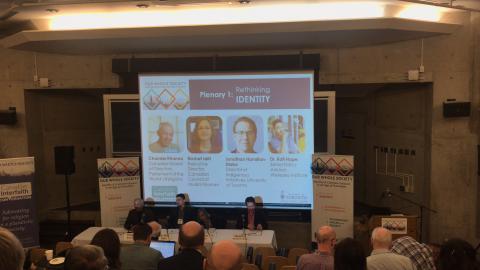A Look Back at Our Whole Society 2019

The fourth iteration of the Our Whole Society conference, sponsored by the Canadian Interfaith Conversation in grateful partnership with a number of organizations, took place in Toronto on April 28-30, 2019, and was attended by around 150 people from diverse religious, interfaith, and public organizations to discuss Identity and Common Ground in an Age of Transition.
The ongoing aim of this series of conferences is to foster dialogue about the changing role of religion in a pluralistic Canadian society. It is a unique opportunity for academics, public servants, interfaith practitioners, and members of religious communities from across Canada to join together and relate their own projects and interests to a wider field of discussion and practice that reaches across disciplines, beliefs, and experiences. By gathering in this way, this year’s conference offered a number of provocative and compelling visions of contemporary life as a shared enterprise of mutual respect.
Dr. Mary Jo Leddy of Romero House and Dr. David Novak of the University of Toronto, in a discussion moderated by Dr. Gerald Filson of the Baha’i Community of Canada, started this year’s conference by discussing what it means to be unified in our diversity. They further considered how developing things like a shared language about religion and fostering communal investment at the local level offer compelling means of enabling this.
In the two days that followed, the conference opened up into a series of panels, keynote addresses, and workshops on areas that present both challenges and opportunities to shared contemporary senses of identity. Over these two days, eleven workshops were offered by conference participants. They engaged more deeply with the conference themes, offered concrete examples of these themes and their implications at work in the world and in the context of interfaith work, and invited extensive group discussion for other participants to connect these themes to their own work and lives in their respective communities.
Panels and keynotes introduced many of the “big questions” at stake in the conference’s three subthemes. The first panel centred on the theme of Rethinking Identity, and raised questions like: What does it mean to be human? How do we protect human dignity in alienating times? And what tools do we have at hand on which to base a shared identity? The Honourable Bob Rae, in his keynote address, then reflected on the large-scale phenomena of populism, nationalism, and religious dogmatism as means of reinforcing social isolation and division.
This led into the following panel on Addressing Extremism and Polarization, wherein panelists considered these isolating dynamics at their extremes within and across religious communities and in the public sphere. Dr. Solange Lefebvre of the University of Montreal then presented some preliminary research on how various media create and further encourage these polarizing conditions which lead to acts of violence against those who are perceived to be “Other.”
The final panel on Technology, Values & Society tried both to imagine a way forward for emerging shared technological spaces, and to acknowledge the difficult task of adjusting to the unprecedented challenges that such new technologies bring with them. When rapidly developing technologies tend to value innovation and efficiency above all, how might the use and development of technology be guided by more humane values? In the final keynote address, Dr. Michael Ruse of Florida State University proposed an alternative reading of Darwinism, arguing for a “Darwinian existentialism” wherein human identity, dignity, and values are predicated on principles of mutual cooperation.
The CIC is grateful to all those who attended, presented at, and volunteered for OWS 2019. The full and active participation of everyone involved was the key to making this year’s conference the success that it was. If you were unable to attend this year’s conference, would like to share compelling conference moments with others, or would like to revisit them for yourself, please visit the OWS 2019 Resources page for videos of the conference's keynote addresses and plenary sessions, photos, and other reflections on the conference from some of our partnering organizations.

